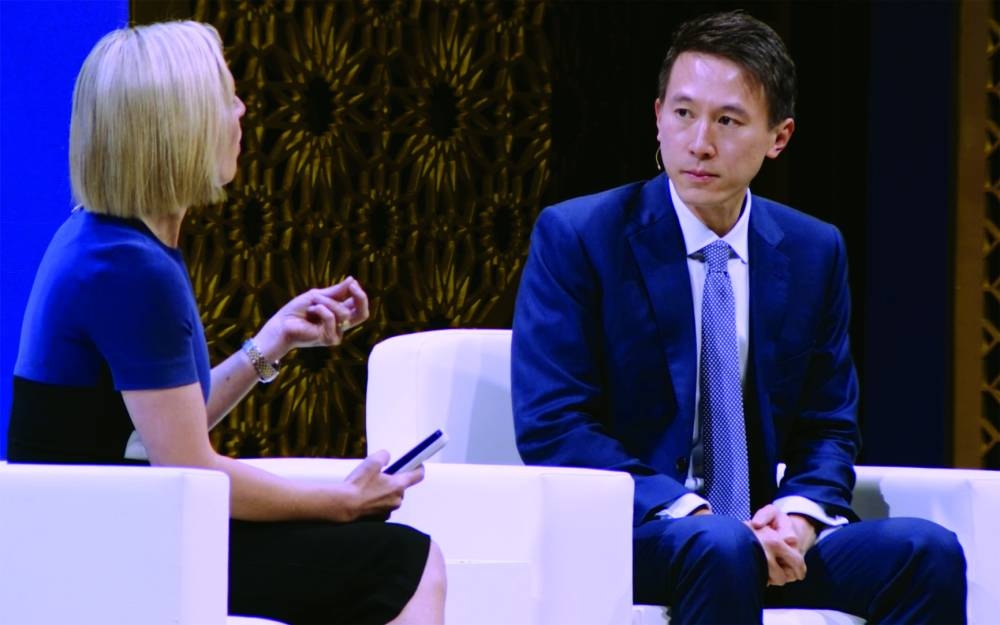TikTok CEO Shou Chew highlighted the importance of free expression and the company’s user value at the Qatar Economic Forum 2023 Tuesday, citing its decision to sue the state of Montana in the US in response to the latter’s attempt to ban the popular social media platform by January 1, 2024.
At a discussion with Bloomberg Television anchor Caroline Hyde, Chew stressed the company’s belief that the Montana bill is unconstitutional and expressed confidence that they will win the legal battle.
He pointed out that some of TikTok’s creators have also filed a separate lawsuit challenging the same bill in the courts, noting that more than 150mn active Americans are on the platform out of the 1bn users across the globe.
“People use TikTok as a place for expression. It is a very different experience as you may know from the other apps that are available in the market, and this is one for discovery, for free expression and a lot of our users use TikTok to find their communities, to discover and to express themselves.
“I think ultimately it is about providing value to these users and making sure that and we continue to provide them with a great service that benefits them,” he said.
Chew underlined TikTok’s positive impact on 5mn small businesses in the US which rely on the app, as well as millions more across the globe, including Qatar and in the region. At the recent congressional hearing where he testified, Chew said provided him the opportunity to tell TikTok's side of the story, addressing the myths and misconceptions about the company.
About data security concerns and reported access to user data by the Chinese government, the CEO stressed that TikTok is not available in mainland China has never been asked by the Chinese government for US user data.
“TikTok is not available in mainland China today as we said many times. The Chinese government actually never asked us for US user data and we will not provide even if asked,” he said.
He cited the implementation of “Project Texas”, which ensures that American data is stored on American soil, managed by an American company, and overseen by American personnel. He added that this project goes beyond industry standards and shows TikTok's commitment to protecting the safety of US user data.
About the global trend of data sovereignty and the localisation of data storage, Chew stressed the key role that global interoperability plays and the need to address concerns about data protection.
Citing the ongoing conversations in the EU, the US, and other countries about data sovereignty, he said TikTok is “ahead of the curve” with projects like “Project Texas” and “Project Clover” in Europe. These projects, he added, involve building data centres in specific regions and adapting data access protocols to comply with local regulations.
“We are slightly ahead of the curve and I think that we need to simultaneously address the concerns about the desire for digital sovereignty while making sure that we don't break the internet, that we don't balkanise this, and we continue to enjoy the benefits of a seamlessly connected global internet,” Chew pointed out.
About artificial intelligence (AI) and content moderation and regulation, Chew underlined the integration of machine learning in TikTok's recommendation algorithm, which enhances the user experience.
“Now beyond that, some of the latest developments particularly by Open AI and the Chat GPT product, could be very profound for productivity. There are many elements like content moderation or creation as a tool for many of our users on our platform that could be unlocked with this new technology. It is very exciting,” he said.
About building TikTok's own language model, Chew said that such is an interesting development in the industry and the company is studying and understanding its implications. “I think it's a very interesting development in the industry and of course, there are many companies that are leading in this, and we're still in the process of making sure that we understand and study this so that's the stage that we are at this moment,” he added.
Chew also emphasised the importance of investing in understanding the risks involved with AI while avoiding to suppress innovation. He suggested a combination of regulations, transparency, and disclosure to navigate the evolving landscape of AI. About a backup plan if TikTok is banned in any state or country, he expressed confidence in the platform's positive impact as he cited examples of users, including one with autism, who have found their voice and connected with communities through TikTok.
“This kind of connection, this deeply impactful positive impact that our product has on people, gives me a lot of confidence that we can have thoughtful conversations with regulators around the world.
“And I'm confident that we are here to stay, not only because of the investments they were putting in to keep the platform safe but because of the impact is having on the users themselves,” Chew added.

TikTok CEO Shou Chew at the Qatar Economic Forum Tuesday.


